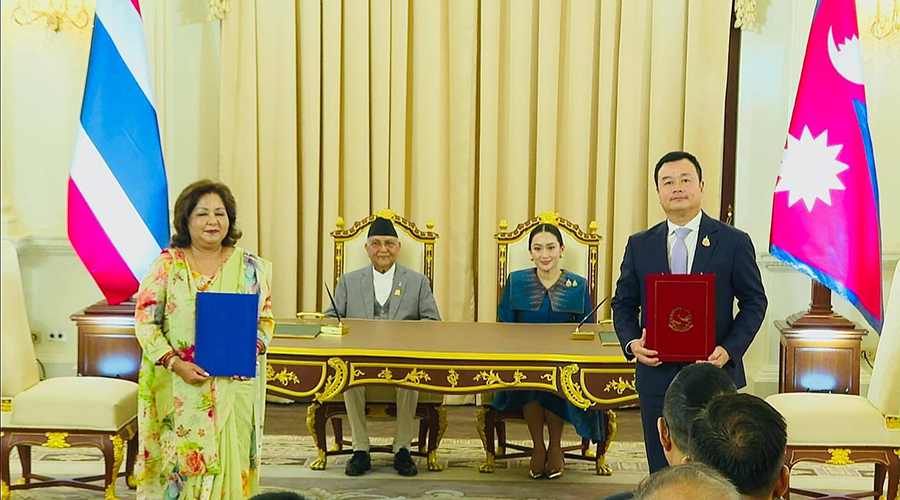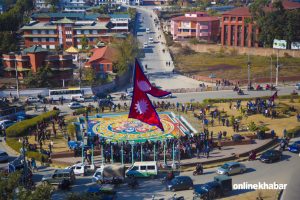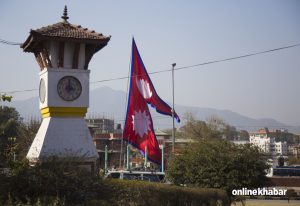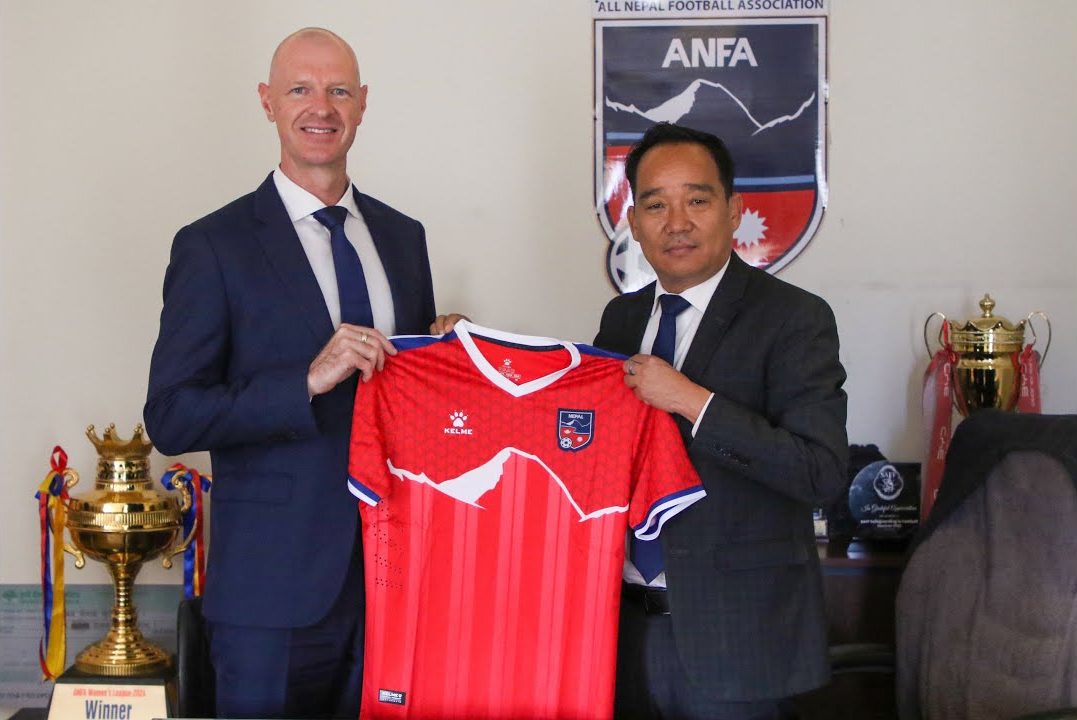
The establishment of The British College in Nepal has opened doors to British education in the country. By forging partnerships with institutions in the United Kingdom, The British College in Nepal has made it feasible for Nepali students to pursue a British degree without having to travel abroad.
Among its notable partnerships, The British College has collaborated with Leeds Beckett University, providing students with a diverse range of academic programmes to choose from.
Students have the option to pursue degrees in business, or computing, or even enrol in the prestigious MBA programme offered by Leeds Beckett University.
Recently, Leeds Beckett University’s pro-vice-chancellor Dr David Ashton visited The British College and interacted with students and faculties. Aston University is playing a pivotal role in the University’s student recruitment strategy, with a focus on advancing the university’s commitment to achieving excellence in equality, diversity, and inclusion.
Onlinekhabar spoke to Ashton, discussing the University’s collaboration with The British College, the significance of inclusion in education, and the reasons why Nepali students should consider pursuing a British degree.
During the interview, he highlighted the mutual benefits the collaboration offers to both institutions and the students involved. The discussion also delved into the importance of fostering inclusivity within the educational system and creating opportunities for diverse student populations.
Excerpts:
Is this your first visit to Nepal?
It is my first time in Nepal. Yes.
Did you have any expectations with the country and with The British College?
I met a colleague in London and in Leeds before arriving. I have been asking him questions about Nepal and what I would find. I have really enjoyed my time in Nepal. I have been awestruck by how friendly everybody has to me. I have been looked after very well.
What is your first impression of the country?
Well, the beauty I suppose. When you fly in and you see Kathmandu–you see the green hills, you see the colourful houses as well. It is a very beautiful place. I really enjoyed flying in. I was told to sit on the left-hand side of the plane to get a beautiful view of the mountains and it was very impressive.
How have you found The British College?
I have really enjoyed my time at The British College. I have been here now and I have been talking to colleagues. I have been very impressed by their commitment towards the students that they teach. I have tried some virtual reality equipment today, which is very state-of-the-art.
Have you interacted with the students here? How have you found them in comparison to students in the UK?
I have given a class this morning on developing strategies in universities for MBA students. The first thing I noticed was that the class was very early in the morning. That does not happen in the UK. We had a good conversation. We had some questions from the students at the end of the class as well, which was very nice to have.
You have been part of various inclusivity programmes at Leeds Beckett University. Any initiatives you have shared with TBC about widening access and promoting inclusion?
Yes, so it is really important to us at Leeds Beckett University that we provide ways for people from the less advantaged parts of society to have an education. And we have a pretty good record at the University.
If I look at the British students who are studying in Leeds, quite a high percentage (maybe about a third) are from, the broadly defined less privileged areas of the UK.
We recognise that for overseas students, it is challenging financially to study. So, you know, that is why partnerships like this are important because they keep the costs down, but you still get the quality education associated with Leeds Beckett University.
Here at TBC, we are looking at providing scholarships to students who do well academically and other ways of supporting talented young academics with their studies.
Are there any initiatives to go beyond Kathmandu and make it accessible to remote areas of Nepal?
So I think we have to wait and see what the new hybrid and digital space provides in terms of opportunities for the partnership and whether we can do things to make the courses more accessible to students from all corners of the country. But that would be one thing that we will think about in the future.
What is so special about a British degree? Why should students pursue one here at TBC?
I think the British degree is very well considered internationally, is it not? A lot of students want to achieve a British degree whether they study directly in the UK or they study through a partnership. But I think the reasons are that the British degrees are recognised for their rigour. Its academic rigour.
Students can be confident if they get a British degree, like the one from Leeds Beckett University that they have got a qualification that will be well viewed from a quality standards perspective.
And I think that is crucial. It creates a passport for students to choose to go and further study or work overseas if that is their choice. Not just in the UK where the degree is of course recognised but all the other countries in the world as they all recognise the quality of British education as well.
What are the similarities that you found here at TBC compared to institutions in the UK?
So one of the similarities is the passion of the academic faculty. So I have been interacting with the faculty here and find they have the same desire that faculties at Leeds Beckett have.
They have the same desire to do the best possible job for the students and commit to supporting them to have excellent learning outcomes. I think that is really striking and I am really delighted that I have seen it here at the TBC.
Was there anything specific the faculty wanted to learn from you?
So we are talking about research and how we can possibly collaborate on research. We talk about practice. What is working well in the UK that might work here at the moment? We are all dealing with the new challenges of Chat GPT and we are all thinking very hard about whether that changes the way we do assessments.
And I have been listening to the solutions that have been employed here at TBC and thinking about whether we are doing the same sorts of things in Lees Beckett or whether we are changing our approach. It comes as no surprise we are on the same line of planning. We are changing the way we construct our assessments and indeed colleagues are doing that here and I think we can learn from each other’s experiences on that.

Recently, eight students were here from LBU as part of a student exchange programme. How important are programmes like these?
I thought that was a great step wasn’t it— to finally have some students from Leed Beckett come here to Kathmandu and I hope that is the start of a more regular exchange. I would like to see students from Nepal also visit Leeds. So that the travel is both ways not just one way and we are trying to make that happen.
It is fantastic to have the experience of coming to a different country like Nepal. And to work alongside the students here, to share the way they learn to learn from each other and to go home again having your horizons expanded. That is within the classroom, also more broadly by experiencing a country as different to the UK is this one I am sure they found it a fantastic experience.
How has the collaboration between TBC and LBU been so far? Whatever you learned and what do you take forward?
So the partnership is a good and an important one. We recognise the hard work of colleagues here at TBC. And I know that my colleagues who travel here more regularly than I do are confident in all that they see with regard to the work that goes on here. So it is reassuring first of all that so we have a strong partnership. We have been talking over the last 24 hours about how we can make the partnership deeper. How we can do more things. I mentioned before we are starting to talk about research. I would like to see the partnership grow in deeper ways so that it is more than just teaching. We are getting into a deep partnership with each other.
It is admission season. Anything you would like to say to prospective students? Why should they choose The British College?
Well, I think The British college would be a great opportunity for many students here in Nepal because first and foremost, you will study for a Leeds Beckett degree. It is just the same in content as though you were in the UK. So the content of the curriculum is the same so you get the opportunity to study it here in Nepal and that can be an advantage in two ways.
First of all, it keeps the costs of studying down and second you get the benefits of local teachers who really know the local educational culture and we will be able to support you through your studies successfully. And of course, at the end of it, you graduate with a Leeds Beckett’s University degree. You also get that wonderful passport that quality passport that will stand you well in life for all the things that you may wish to do next.























